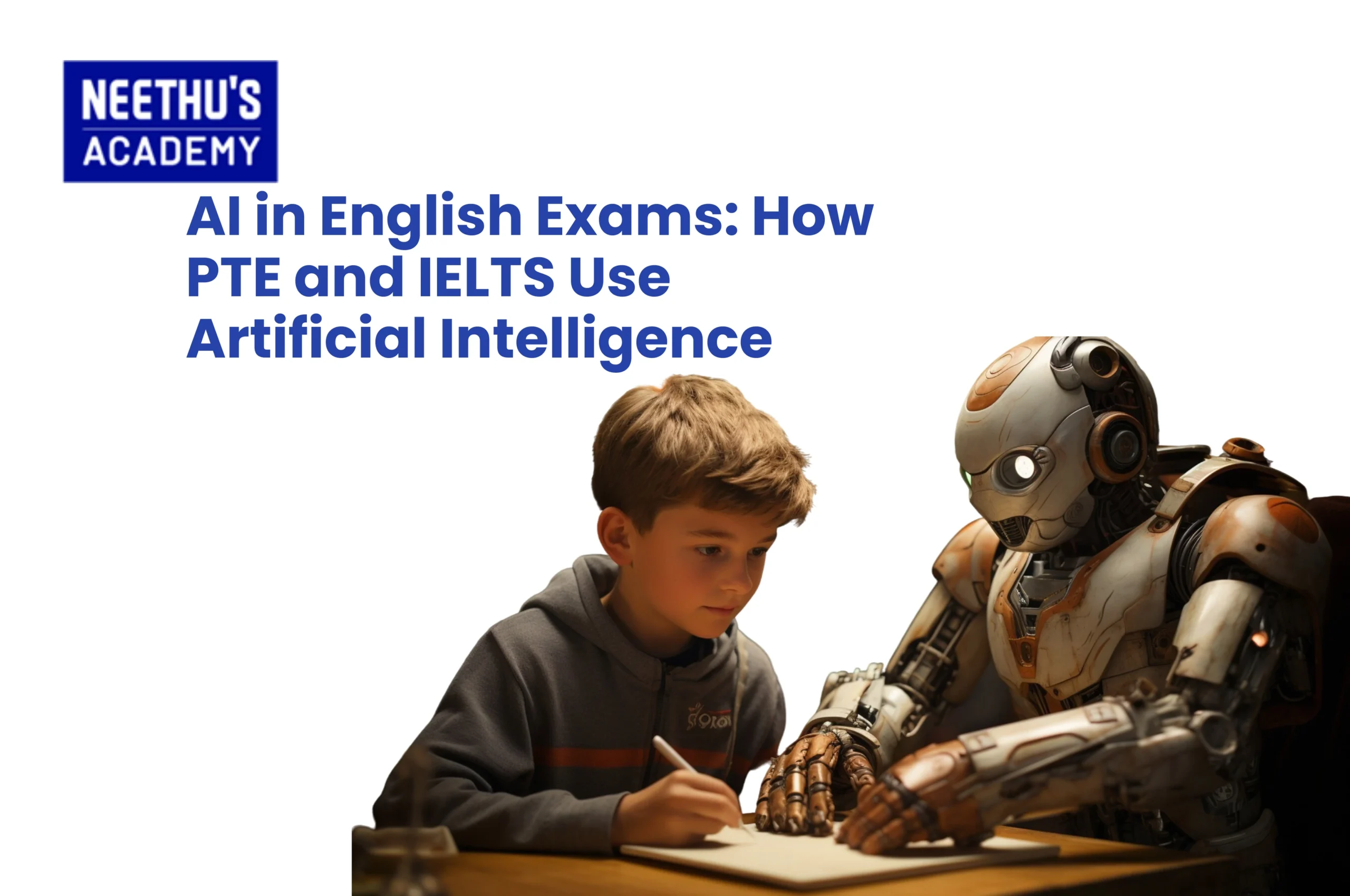Proving one's ability in the English language is a prerequisite for employment, education, or immigration to English-speaking countries in the globalized world.…

AI in English Exams: How PTE and IELTS Use Artificial Intelligence
In this age of digitalisation, Artificial Intelligence (AI) is transforming numerous sectors—education and testing among them. AI in English tests has emerged as a game-changer, particularly in international proficiency exams such as PTE (Pearson Test of English) and IELTS (International English Language Testing System). With millions of test-takers annually, accuracy, fairness, and efficiency are paramount, and AI-based evaluation systems are filling in the gaps to improve the process. Whereas AI assures objectivity and quickness, it also brings questions of fairness, dependability, and balance between human judgment and technology.
What follows is an analysis of how AI is used for PTE scoring, how AI is being implemented in IELTS testing, the advantages of AI-based testing, issues related to it, and where the future will lead for English language proficiency tests globally.
How PTE Uses AI for Scoring Speaking & Writing
PTE Academic has pioneered the application of AI for scoring exams, especially for speaking and writing responses. In contrast to conventional tests where responses are evaluated by human raters, PTE employs a sophisticated AI engine that has been trained on thousands of samples rated by humans to judge candidates’ performance.
- Speaking Assessment: AI software inspects pronunciation, fluency, intonation, stress, and rhythm. The system assesses a candidate’s speech against a large pool of native and non-native speakers to maintain homogeneity.
- Writing Assessment: PTE’s AI verifies grammar, vocabulary range, coherence, spelling, and quality of written discourse. It detects errors that may go unnoticed by humans while holding each test-taker accountable to the same measure.
The greatest benefit in this case is consistency—each candidate gets an unbiased mark independent of human fatigue, mood, or personal interpretation. PTE’s application of AI in English tests demonstrates how technology can standardize English language test taking on a global level.
IELTS Use of AI Tools in Marking
IELTS, among the most popular tests for study and immigration, traditionally depends on human examiners for speaking and writing tests. Nevertheless, the last few years have witnessed IELTS embracing AI in IELTS testing in certain aspects to enhance efficiency and assist examiners.
- Computer-Based Writing Marking: IELTS is piloting the use of AI tools to pre-score writing samples, which are then marked by human examiners. This model-assisted scheme allows for faster marking without compromising human oversight.
- Computer-Based Speaking Aids: A few pilot programs are implementing AI-enabled speaking assessment to give immediate feedback. For instance, test-takers can attempt speaking tasks via AI-based platforms prior to writing the actual test.
- Data Analysis for Consistency: AI also supports IELTS examiners by monitoring patterns, highlighting inconsistencies, and ensuring that marking aligns with international standards.
Although IELTS has not fully transitioned to AI-only scoring, its gradual integration of AI ensures both fairness and trust in the system. This hybrid approach reflects IELTS’s careful balance between automation and human judgment.
Benefits of AI-Driven Testing
The increased use of AI in English exams provides a range of benefits for test providers and test-takers alike:
- Fairness and Consistency: AI subjects all test-takers to the same scoring standards, minimizing subjectivity.
- Scalability: With millions of test-takers globally, AI enables test scores to be assessed quickly and accurately.
- Quicker Results: AI facilitates faster processing, so candidates get their results sooner than paper-marked exams.
- Careful Feedback: Sophisticated AI systems are able to highlight weaknesses in pronunciation, vocabulary, or grammar, allowing learners to advance.
- Less Human Bias: Compared to human examiners who, often unintentionally, prefer a particular accent or style of writing, AI assesses on the basis of trained models of data.
These advantages make AI especially appealing for international exams such as PTE and IELTS, where consistency and credibility are paramount.
Issues: Unfairness, Bias, Reliability
While AI on high-stakes exams has its advantages, there are some legitimate concerns.
- Bias within Training Data: AI systems trained mostly on specific accents or writing styles can leave candidates from disadvantaged backgrounds at a disadvantage.
- Limited Human Understanding: AI can have trouble with subtleties such as humor, creativity, or cultural context that a human examiner would be able to comprehend.
- Transparency Concerns: Candidates are often skeptical regarding the manner in which AI arrives at its scoring. This leads to trust concerns.
- Dependence on Technology: Technical issues or algorithmic errors may arbitrarily affect candidates’ scores.
These are problems why a harmonious balance—where technology assists the process, but human intervention can guarantee fairness and reliability—needs to be developed.
Future of AI in Global English Exams
In the future, the use of AI in PTE scoring and AI in IELTS testing will keep growing. The future probably includes hybrid models where AI makes the first score and then humans check and confirm the result. This hybrid model leverages speed, efficiency, and consistency with human capacity for context and nuance.
We can also expect AI to be used more extensively for:
- Personalized Learning: Providing AI-based practice platforms customized to a student’s area of weakness.
- Adaptive Testing: Dynamically altering difficulty levels as a candidate responds.
- Immigration and Academic Integration: Facilitating quicker processing for applications that need English proficiency scores.
Ultimately, the future rests in finding the correct balance—using AI to enhance efficiency without taking away the human element of fairness and empathy.
Conclusion
The emergence of AI in English tests is changing the way international exams such as PTE and IELTS are given. While PTE is at the forefront with AI-based scoring in speaking and writing, IELTS is cautiously embracing AI tools in conjunction with human markers. The advantages—consistency, fairness, speed—are irrefutable, but worries regarding bias and reliability cannot be overlooked.
The future of English language proficiency testing is in harmonious collaboration between humans and artificial intelligence, where precision and fairness go hand in hand. For test-takers, it is essential to know how AI influences their exam experience in order to prepare well and gain confidence.
Frequently Asked Questions
Yes, IELTS applies AI tools in writing and speaking assessment, but the final scoring involves human testers.
PTE’s AI aligns your speech with a massive repository of native and non-native speakers’ speech to measure accuracy, fluency, and clarity.
Yes, AI-powered scoring such as PTE’s is generally accepted for immigration because it provides consistent and objective assessment.
Not entirely—AI will probably supplement scoring, but human review will still be necessary for fairness and subtlety.
Related Blogs
- All Posts
- IELTS
- PTE
It is absolutely possible to increase your score in IELTS speaking within one month if you are motivated, really well prepared, and…
The reading module of the IELTS exam tests your comprehension skills on a variety of question types in a short period. Among…
Course Enquiry
Latest Posts
- All Posts
- canada
- CBT
- DHA
- French
- GENERAL
- German
- IELTS
- IQN NEW ZEALAND
- MOH
- NCLEX-RN
- NHRA
- OET
- OSCE
- PROMETRIC
- PTE
- TOEFL
- Back
- NCLEX - NGN
- Back
- OET FOR PHYSIOTHERAPIST
- OET FOR PHARMACIST
- OET FOR DOCTORS


